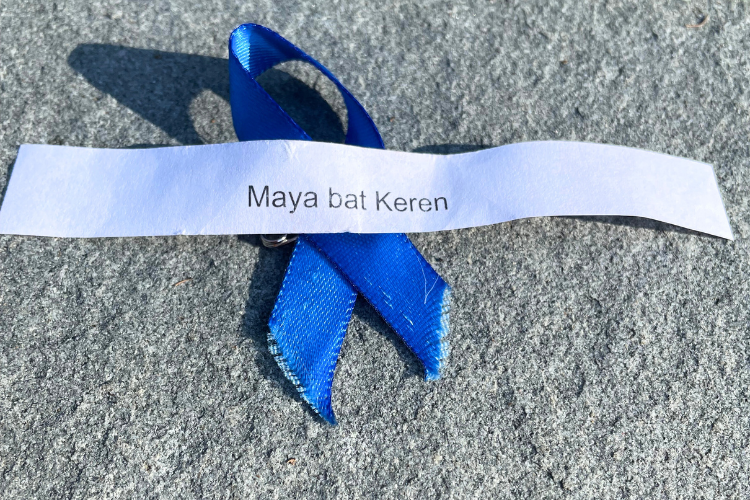
Bring Them Home
Last Sunday I spent the afternoon in Washington, D.C., where the sisterhood of Adas Israel congregation had invited me, months ago, to address their opening event of 5784. Greeting people as they entered the room was a table holding two baskets, one with blue ribbons and the other filled with small slips of paper. It wasn’t until I drew closer that I understood. It’s difficult to hold in our minds—and hearts, and horrified imaginations—all the more than 225 individuals who have been kidnapped by Hamas and are being held—who knows where and under what conditions—in Gaza. Each slip of paper contained the Hebrew name of just one hostage. Not the first and last name as you’d expect to see it on a list, or a legal document, but the formula for naming a Jew being called to the Torah, being welcomed into the Jewish people, being prayed for or being buried. My slip of paper reads “Maya bat Keren.” Maya, daughter of Keren. I don’t know if she’s one of the children, or a music festival unfortunate, or a kibbutznik. But since Sunday I’ve been thinking of her.
We are three weeks into the most threatening time I have lived through as a Jew.
I don’t need to rehearse for you here the invasion, the brutal attacks, the sadism and glee in the butchering of Jews, from infants to the elderly. The pursuits, the kidnapping, the seizing of the hostages.
Stunned and wretched over the attacks, and fearful of what news might follow, Lilith has been sharing the words of women rabbis and others whose wisdom led them to their just and impassioned support for Israelis, and Jews, and our right to survive. That we’ve also been asking what poems or foods or activities are sustaining us now must not pull us aside from the very issue of the survival of people in mortal danger, including and especially the hostages. The genuine comfort I hope we all seek right now is hearing allies speak out for Israel’s right—and its necessity—to exist.
Israel’s national anthem “Hatikvah,” “The Hope,” is that Jews will be able to live as a free people in our own safe place, with agency over our own lives. The existential threat many Jews now live under challenges that hope. Active threats to life and physical safety (not just to identity) are unfortunately familiar—the Tree of Life synagogue murders five years ago, the public hangings and persecutions of Jews in Iran 24 years ago, attacks on Jews in North Africa, torment of Jews under Soviet rule just a few decades back, the lives and deaths of traumatized relatives and ancestors in Europe, in Spain under the Inquisition. Yet the pogrom-like terrorist slaughter of Jews on October 7 caused, as you’ve heard many times by now, the worst loss of life in a single day since the Holocaust. Add to these histories the nightmare of what we can imagine is happening to all the hostages, alone and unprotected in Gaza.
Every person yearns to live in freedom and safety. This is the “nevertheless” part; we can assume that on all sides of a conflict people want to be spared, to be written in the Book of Life. Netanyahu’s widely recognized failures to lead justly and decently have been superseded by his government’s complete failure to accomplish the basic task of protecting residents of Israel from life-threatening carnage in their own homes and villages. Israel has a duty and a right to make sure that such atrocities cannot be repeated.
This Shabbat, I plan to light a memorial candle for my mother, whose yahrzeit it is, and, along with the Shabbat candles, a candle for those who died three weeks ago in Israel, praying that there be no more loss of life. And I’ll keep an empty seat at the Shabbat table for Maya bat Keren (though maybe she needs a high chair), in the hope that all of the hostages may be released to return safely and soon to the ones awaiting them and trembling for them, day and night.



